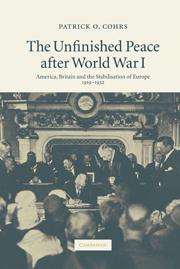Book contents
- Frontmatter
- Contents
- Acknowledgements
- List of abbreviations
- A note on the footnotes and bibliography
- Introduction
- Prologue
- 1 The wider challenges
- 2 Wilson, Lloyd George and the quest for a ‘peace to end all wars’
- 3 The ill-founded peace of 1919
- 4 The escalation of Europe's post-Versailles crisis, 1920–1923
- Part I The Anglo-American stabilisation of Europe, 1923–1924
- 5 Towards a Progressive transformation of European politics
- 6 Towards transatlantic co-operation and a new European order
- 7 The turning-point
- 8 From antagonism to accommodation
- 9 The two paths to the London conference
- 10 The first ‘real’ peace settlement after World War I
- Part II Europe's nascent Pax Anglo-Americana, 1924–1925
- Part III The unfinished transatlantic peace order: the system of London and Locarno, 1926–1929
- Epilogue
- Conclusion
- Map: Post-World War I Europe after the peace settlement of Versailles
- Bibliography
- Index
5 - Towards a Progressive transformation of European politics
The reorientation of American stabilisation policy, 1921–1923
Published online by Cambridge University Press: 21 July 2009
- Frontmatter
- Contents
- Acknowledgements
- List of abbreviations
- A note on the footnotes and bibliography
- Introduction
- Prologue
- 1 The wider challenges
- 2 Wilson, Lloyd George and the quest for a ‘peace to end all wars’
- 3 The ill-founded peace of 1919
- 4 The escalation of Europe's post-Versailles crisis, 1920–1923
- Part I The Anglo-American stabilisation of Europe, 1923–1924
- 5 Towards a Progressive transformation of European politics
- 6 Towards transatlantic co-operation and a new European order
- 7 The turning-point
- 8 From antagonism to accommodation
- 9 The two paths to the London conference
- 10 The first ‘real’ peace settlement after World War I
- Part II Europe's nascent Pax Anglo-Americana, 1924–1925
- Part III The unfinished transatlantic peace order: the system of London and Locarno, 1926–1929
- Epilogue
- Conclusion
- Map: Post-World War I Europe after the peace settlement of Versailles
- Bibliography
- Index
Summary
The interpretation of America's ‘futile’ quest for French security, German rehabilitation and wider European stability after World War I has undergone many revisions. Early indictments of ‘fatal American isolationism’ have been rejected. For any less than superficial research showed that the United States never completely withdrew from Europe after 1919; and recent research has even emphasised underlying continuity between Wilson's internationalism and Republican policy in the ‘Wilsonian century’. Yet the nature and implications of America's selective involvement in stabilising, or destabilising, the Old World remain the subject of controversy.
Arguably, the still most substantial attempt at synthesis interprets post-Wilsonian policy as a ‘corporatist’ bid for American commercial expansion and European reconstruction. It accounts for its dynamics, and limits, by pointing to a strong consensus emerging among the ‘new era's’ political and commercial elites. It was the consensus that America's interest was served best by relying almost exclusively on US financial leverage, economic practices and private agents to stabilise Europe and reform the world economy. Both were to be remade after the example of the ‘corporatist order’ of liberal capitalism underpinning America's return to ‘normalcy’ – or, in fact, ‘Republican restoration’ – under Harding and Coolidge. Still prevalent, then, is the view that these were also the remedies Wilson's successors applied, in vain, to the Franco-German dilemma, seeking ‘to revitalise Germany's productive power without restoring its prewar hegemony’.
Undoubtedly, the ‘corporatist synthesis’ reveals one important dimension of interwar American foreign relations: its domestic determinants and constraints.
- Type
- Chapter
- Information
- The Unfinished Peace after World War IAmerica, Britain and the Stabilisation of Europe, 1919–1932, pp. 79 - 89Publisher: Cambridge University PressPrint publication year: 2006



